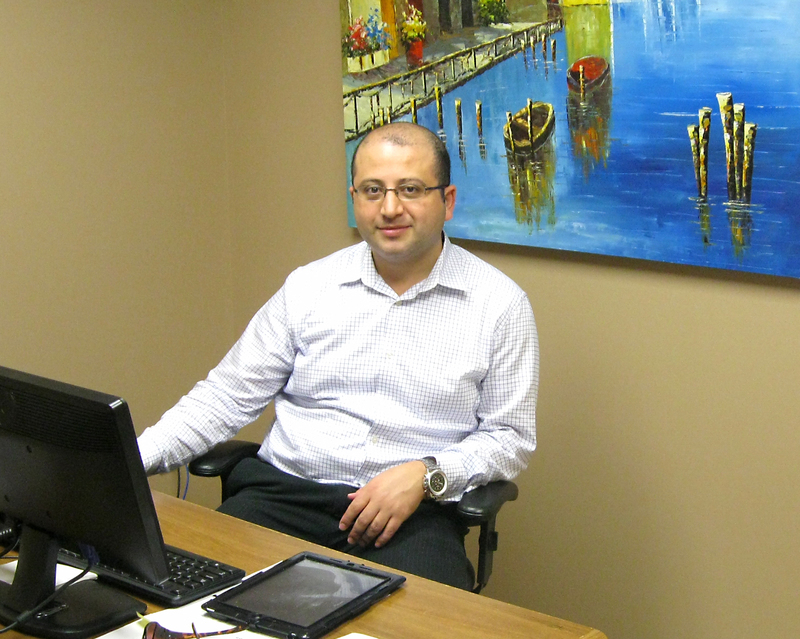In September, doctors for the first time corrected a heart rhythm problem at Beebe Medical Center in Lewes.
Dr. Firas El Sabbagh performed the medical center's first cardiac ablation. During the surgery, a catheter is inserted in a patient's groin area, and it is sent through a vein to the heart chamber. Using advanced 3D mapping technology, El Sabbagh locates areas of the heart that cause rhythm problems. Once the areas are located, El Sabbagh uses the tip of the catheter to burn a small spot of heart tissue.
Irregular heartbeats are caused by abnormal electrical activity of the heart. For simple heart-rhythm problems, the ablation procedure has a success rate of 90 percent to 95 percent, said El Sabbagh.
An arrhythmia known as supraventricular tachycardia is the most benign form of heart arrhythmia. This problem begins above the heart ventricles and may start and end quickly so patients may not have symptoms. It becomes a problem when it happens often or lasts a long time.
In simple cases, people with SVT may feel dizzy, light-headed or feel like their pulse is pounding.
The first ablation procedures El Sabbagh performed here were to treat SVT, which can affect people of all ages.
"In most cases the arrhythmia doesn't return," he said. "Medications to correct the problem are only effective 25 percent to 50 percent of the time, so ablation is a better option."
|
Factors for cardiac problems Age is the biggest factor for heart rhythm problems, but treatable conditions such as high blood pressure, obesity and sleep apnea are also factors, said El Sabbagh. Atrial fibrillation is often caused by underlying heart disease that includes: • Problems with the heart valves • Impaired blood flow to heart muscle, • Weakened heart muscle • Damage to the heart from long-standing, untreated high blood pressure • Thyroid problems, infections or lung diseases can also lead to atrial fibrillation. |
September is National Atrial Fibrillation Awareness Month when doctors hope to educate the public about the condition, which affects 2.2 million Americans. El Sabbagh explained atrial fibrillation is the most common cardiac arythmia encountered in his practice. It most often affects people who are more than 60 years old.
Atrial fibrillation is a relatively complicated form of arrhythmia because it starts in the left upper chamber or atrium of the heart.
Atrial fibrillation also increases the risk of stroke because the heart does not beat strongly and regularly, and as a result, blood collects in the atria.
In October, he hopes to expand the cardiac ablation program to include ablation for atrial fibrillation.
"Atrial fibrillation can limit the quality of life," El Sabbagh said.
An electrocardiogram, or EKG, helps El Sabbagh diagnose an atrial fibrillation, but in most cases, patients are referred to El Sabbagh by a family doctor or cardiologist, so the first time he sees a patient, he is armed with a history of the patient's heart problems, as well as lab tests and EKG.
Based on the diagnosis, El Sabbagh discusses the possibility of ablation procedure to correct the electrical disruption in the patient's heart, after the patient has failed antiarrhythmic drug therapy.
"These are complicated procedures that often carry about a 1 percent risk of complication," El Sabbagh said.
For those with heart disease, he said the procedure is most helpful during the early stages. Ablation does not affect the heart's function, he said, but it is also not 100 percent successful in all cases.
"It is better to act on it early before the disease progresses," he said.
Starting the program
When El Sabbagh graduated from medical school in Lebanon, he knew he wanted to continue his medical education in the United States. He completed his internal medicine residency at Cleveland Clinic in Ohio. Then he did a cardiology fellowship at University of Missouri. He completed his advanced cardiac electrophysiology training at University Hospital's Case Medical Center/Case Western Reserve University in Cleveland.
Electrophysiology is the science of understanding, diagnosing and treating the electrical activity in the heart.
"I had two extra years of specialized training, above what a cardiologist goes through," El Sabbagh said, training that gave him many opportunities following his fellowship.
"I knew I could go to an already established program somewhere else, but when I came here, the excitement everyone had for the program was addictive," said El Sabbagh, who just turned 35.
The excitement lured him in, and he relocated to the Milton area with his wife and two daughters.
He joined Dr. George Dahr's practice in July at Clinic By the Sea, and now keeps office hours in Long Neck and Lewes. He does lab work and surgery at Beebe Medical Center.
Before starting the electrophysiology service, Beebe Medical Center offered only pacemaker procedures. Doctors often sent patients to Peninsula Regional Medical Center in Salisbury or to Christiana in New Castle County for heart-rhythm procedures.
"I had other opportunities, but joining this new program is a project I wanted to succeed in doing," El Sabbagh said. "The excitement was contagious."
For more information or to make an appointment, call 302-644-0999 or 302-231-2089.

















































